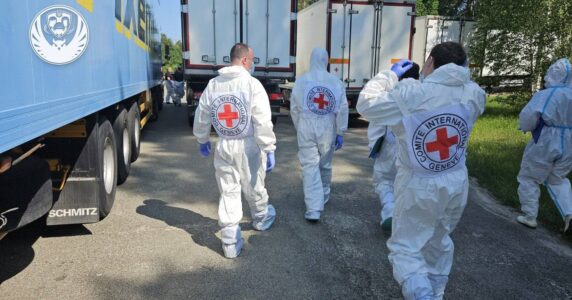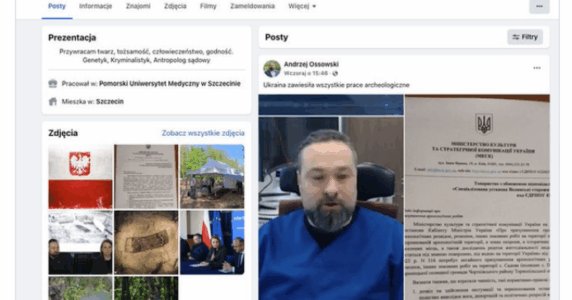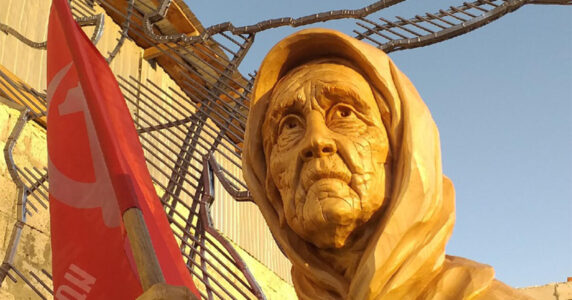Navigation and useful materials
The aggressive actions of Russia sharply diverge from the fundamental principles of international law. Therefore, they cannot be approved either by a majority of independent states or by influential international organizations such as the OSCE, the Council of Europe, and UN structures.
However, the Kremlin’s propaganda is trying to smooth out this unfortunate fact by engaging certain foreign citizens in their illegitimate actions. Thus, at least the illusion of “international support” for the Kremlin’s illegal actions is created.
Since 2014, the Russians have regularly brought foreigners to Crimea and to the occupied areas of Donbas and filmed propaganda stories with them. Marginal politicians, bloggers and “independent journalists” from different countries were constantly assuring Russian media of “recognition of Crimea as part of Russia,” talked about the “genocide of the peoples of Donbas,” and relayed other messages of Kremlin propaganda.
A special role in the quasi “legitimization” of the pseudo-referenda of 2014 was played by the so-called “foreign observers.” Due to their participation in the organization of illegal “voting,” the Kremlin got reason to talk about the compliance of “plebiscites” with international norms, “OSCE standards” and began to convince the domestic audience of Russia having many friends abroad among politicians, journalists, and intellectuals. Russian propaganda preferred never to mention how selfless this “friendship” is.
Pseudo-referenda held by the Russian occupiers in the occupied parts of Donetsk, Luhansk, Zaporizhzhia, and Kherson regions at the end of September did not do without “observers” from abroad. Citizens of a number of European, African, and Latin American countries helped the Russians conduct the show. OSINT was able to identify 64 of these helpers. The Centre for Strategic Communication and Information Security publishes a list of these individuals.
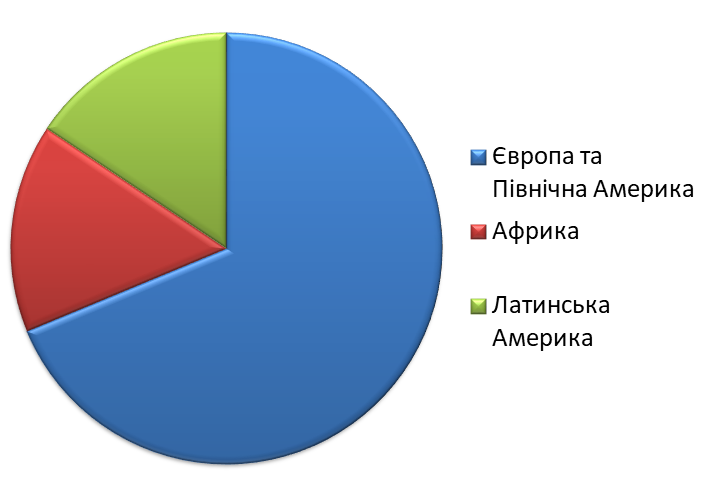
The largest group consists of citizens of European countries — 43. EU and/or NATO countries were “represented” by 38 people: 37 Europeans and one American. Among them are 11 citizens of France, 8 — of Italy. Two “observers” each were from Spain, Lithuania, and the Czech Republic, four each from Germany and Bosnia and Herzegovina. It was also possible to identify citizens of the United States, Great Britain, Greece, Latvia, the Netherlands, Norway, Slovakia, Finland, Serbia, Montenegro, and Belarus.
Belarus:
● Vadim Gigin (Vadzim Hihin) — former dean of the Faculty of Philosophy and Social Sciences of Belarusian State University;
Bosnia and Herzegovina:
● Milovan Bayagich — a military analyst;
● Slobodan Soja — a historian who regularly serves as an observer in Russian elections;
● Oleg Soldat — a historian who cooperates with the Russian World Foundation in Banja Luka (the administrative centre of Republika Srpska as part of BiH);
● Danijel Simic — head of Association of Journalists of Republika Srpska and editor of the Frontal portal;
United Kingdom:
● Vanessa Beeley — blogger and conspiracy theorist, political commentator on Russian TV channels. Disseminated conspiracy theories about the war in Syria, publicly supports the dictator regime of Bashar al-Assad;
Greece:
● Konstantinos Androniku — political analyst, advisor to the mayor of Almopia (Central Macedonia);
Spain:
● Fernando Moragon — President of the Hispano-Russian Observatory of Eurasia Association (Observatorio Hispano-Ruso de Eurasia);
● Mais Elkridi — member of the Constitutional Committee of Syria;
Italy:
● Eliseo Bertolasi — correspondent of Sputnik and Voice of Russia, editor of Geopolitics, graduate of the Ryazan Guards Higher Airborne Command School;
● Gianfranco Vestuto — president of Italeurasia Promonetwork organization, editor of the Russian News website, head of the Lega Sud Ausonia party;
● Giuseppe Luca Genovese — member of the separatist party “League of North” (Lega Nord);
● Graziarosa Villani — journalist;
● Vito Grittani — co-founder of the International Diplomatic Observatory;
● Ivo Starc — co-founder of the International Diplomatic Observatory;
● Gian Micalessin — founder of Albatross Press Agency;
● Marco Pata — lawyer, considers himself to be an expert in the field of geopolitics and international relations;
Latvia:
● Alina Guerlinya — deputy editor-in-chief of the Baltnews project of the Russia Today news agency, a graduate of the Moscow State University of International Relations, a participant in the “Leaders of Russia” competition;
Lithuania:
● Erika Švenčionienė — head of the pro-Russian organization “International Forum of Good Neighbourhood”;
● Edikas Jagelavičius — member of the pro-Russian organization “International Forum of Good Neighbourhood”;
The Netherlands:
● Sonja van den Ende — journalist who collaborated with the left-wing publication CovertAction Magazine;
Germany:
● Stefan Schaller — former managing director of the energy company Energie Waldeck-Frankenberg GmbH;
● Sergej Viktorovich Filbert — citizen of Germany of Russian origin, founder of the Voice of Germany information portal;
● Arthur Leyer — Head of the Weltnetz.TV information portal, which relays Russian propaganda in German;
● Christoph Hörstel — political expert, political commentator of Russia Today, founder of the far-right party “German Center” (Deutsche Mitte);
Norway:
● Hendrik Weber — municipal MP (Alver city), former member of the Redt party;
Serbia:
● Deyan Mirovich — deputy Head of the far-right Serbian Radical Party, professor at the University of Kosovska Mitrovica;
Slovakia:
● Lubica Blaskova — former member of the ultra-right party Vlast, ex-secretary of the Russian-Slovak Society;
USA:
● Wyatt Reed — correspondent of the Russian state information agency Sputnik;
Finland:
● Janus Putkonen — journalist, consultant of the Russian occupation administration in Luhansk;
France:
● André Chanclu — former member of the far-right movement Groupe Union Defense and a member of the neo-fascist group “New Order” (Ordre nouveau), co-founder of the Organizations Committee “France-Russia” and Committee “France-Donbas”;
● Emmanuel Marc Andre Leroy — ultra-right activist, former advisor to Marine Le Pen, owner of the pro-Russian resource stoprussophobie.info;
● Estelle Mose — wife of Emmanuel Leroy;
● Antonin Burat — freelance journalist;
● Xavier Moreau — owner of the Russian security company “Sokol Holding” and the site Stratpol, lives in Moscow since 2000;
● Kristel Nean — left-wing journalist, collaborated with Donbass Insider and Reseau International, spokeswoman for the MSS of DPR;
● Yvan Benedetti — spokesman of the neo-fascist party “Nationalists” (Les Nationalistes);
● Pierre-Emmanuel Thomann — professor at the Institute of Social, Economic and Political Sciences (Institut des sciences sociales, economiques et poitiques, ISSEP), political commentator of Russia Today;
● Leo Nicolian — pro-Russian blogger and conspiracy theorist;
● Arnaud Develey — lawyer, political commentator of the Russian state media, reviewer of the resource “Geopolitics”;
● Alain Corvez — retired serviceman, political commentator of Russia Today;
Czech Republic:
● Roman Blaško — member of the Communist Party of Bohemia and Moravia and a number of pro-Russian communist organizations, editor-in-chief of the liquidated edition Haló noviny;
● Jaromir Vašek — left activist, editor of the pro-Russian resource donbas.cz, correspondent of the communist publication Naše Pravda, which is the successor of the closed Haló noviny;
Montenegro:
● Igor Damyanovich — head of the “Immortal Regiment of Montenegro,” Russian war correspondent.
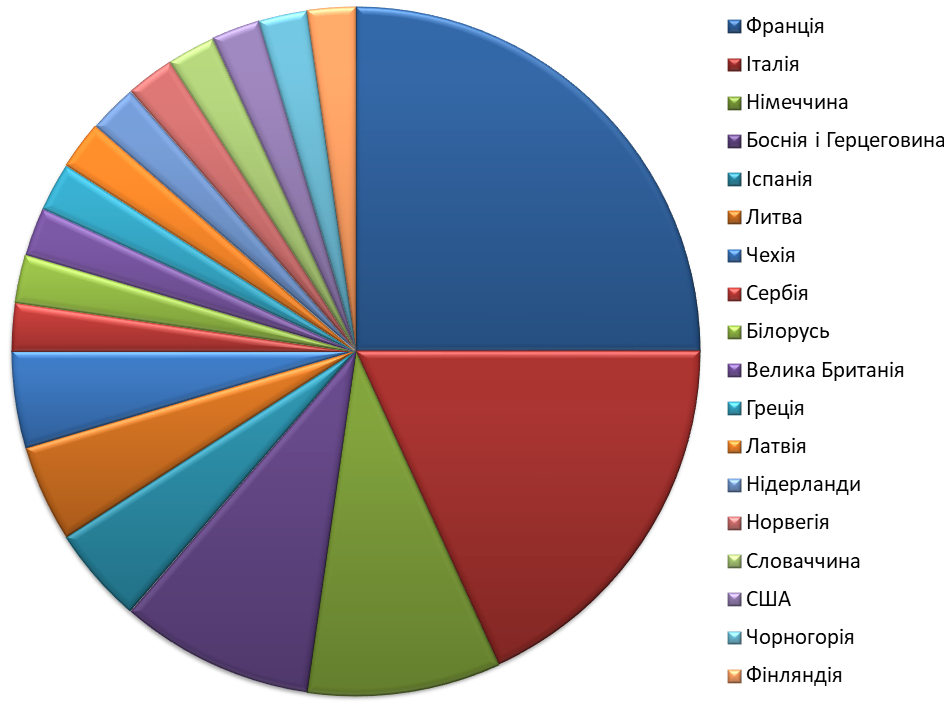
The group of African citizens consists of 10 people (three citizens of South African Republic, as well as citizens of Egypt, Zimbabwe, Mozambique, CAR, Ghana, and Togo).
Ghana:
● Kwesi Gyamfi — freelance journalist;
Egypt:
● Ismail Refaat — editor of Youm Al-Sabaa, lecturer of journalism at the Lyon Academy (France);
Zimbabwe:
● Tapiva Masenda — head of the youth wing of the political headquarters of the Zimbabwe African National Union — Patriotic Front Party (Zanu-PF);
Cameroon:
● Mireille Muel — considers herself to be a politician;
Mozambique:
● Jose Matemulane — head of the AFRIC think tank, supposedly financed by the structures of the Russian Yevgeny Prigozhin;
South African Republic:
● Stella Mondlane — head of the council of the municipality of Matlosana, member of the youth wing of the African National Congress party. Suspected of misuse of budget funds;
● Khulekani Mondli Skosana — activist of the youth wing of the African National Congress;
● Ziyanda Ncuru — member of the regional executive committee of the Young Communist League of South Africa;
Togo:
● Mavuli Komi Apati-Bassakh — head of the People’s Action Party;
Central African Republic:
● Loic Molambo-Saombi.
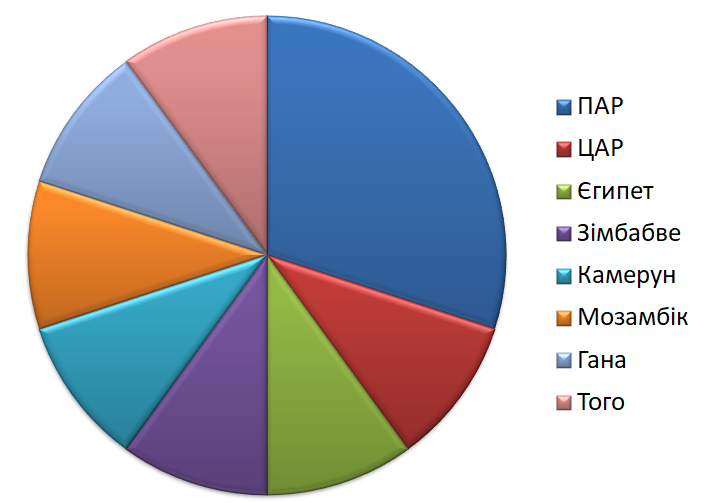
Of the four Latin American countries, 10 “observers” were also noticed at the pseudo-referenda: five Brazilians, as well as citizens of Venezuela, Uruguay, and Colombia.
Brazil:
● Devanir Cavalcante de Lima – assistant head of the secretariat of the City Hall of Gaurúlús (state of São Paulo);
● Henrique Domingues – a member of the Communist Party of Brazil, a columnist for the left-wing publication “Red Magazine”;
● Tania Mara Mandarino — a left-wing activist, coordinator of the “Advocates for Democracy” organization;
● Vanessa Martina Silva — a journalist, editor of the left publications Revista Diálogos do Sul and Opera Mundi;
● Gabriela Beraldo — a left-leaning freelance journalist;
Venezuela:
● Janlisbert Velasco – left-wing activist;
● Dia Nader de El-Andari – former ambassador of Venezuela to Syria (2006-2009), former chargé d’affaires of Venezuela in Serbia (2011-2019);
Colombia:
● William Eduardo Parra Jaimes — a freelance journalist, former spokesman of former president Ernesto Samper. In hiding from investigative authorities in Colombia, who accuse him of ties to the far-left terrorist group FARC;
Uruguay:
● Sebastian Hagobian Lopez – head of the organization “Permanent Conference of Political Parties of Latin America and the Caribbean” (A Conferencia Permanente de Partidos Politicos da America Latina e Caribe, COPPPAL), member of the Socialist Party of Uruguay;
● Sebastián Hagobian — a left-wing activist, a member of the COPPPAL youth wing.
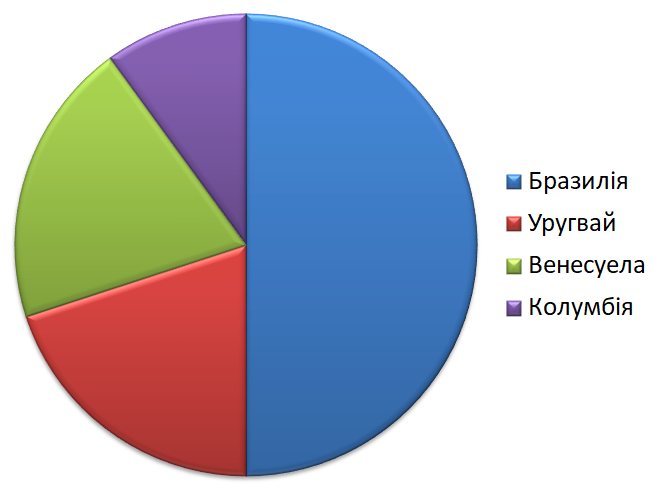
Compared to 2014, the “international representation” looked much more modest. The Security Service of Ukraine established that “DPR” militants “retrospectively” invited “observers” from Europe and Central Asia — no less fake than the pseudo-referendum organized by Russians.
Some of those who really participated in this show “worked” not in the area of hostilities, putting themselves in direct danger, but rather at “polling stations” in Russia, open to Ukrainian citizens and owners of passports issued by pseudo-republics “LPR” and “DPR.”
For one, in the so-called “representative office” of “DPR” in Moscow, the “voting” was “observed” by Loic Molambo-Saombi from the Central African Republic, Mireille Muel from Cameroon, Alina Guerlinya from Latvia, Dia Nader el-Andari from Venezuela, Emmanuel Marc Andre Leroy and Estelle Mose from France. The polling station in St. Petersburg was “observed” by Brazilian citizen Tanya Mara Mandarino, and the one in Novocherkassk of Rostov oblast — by fellow Brazilian Vanessa Martina Silva. Brazilians Devanir Cavalcante de Lima and Enrique Dominguez acted as “international observers” at the “polling station” in the occupied Sevastopol.
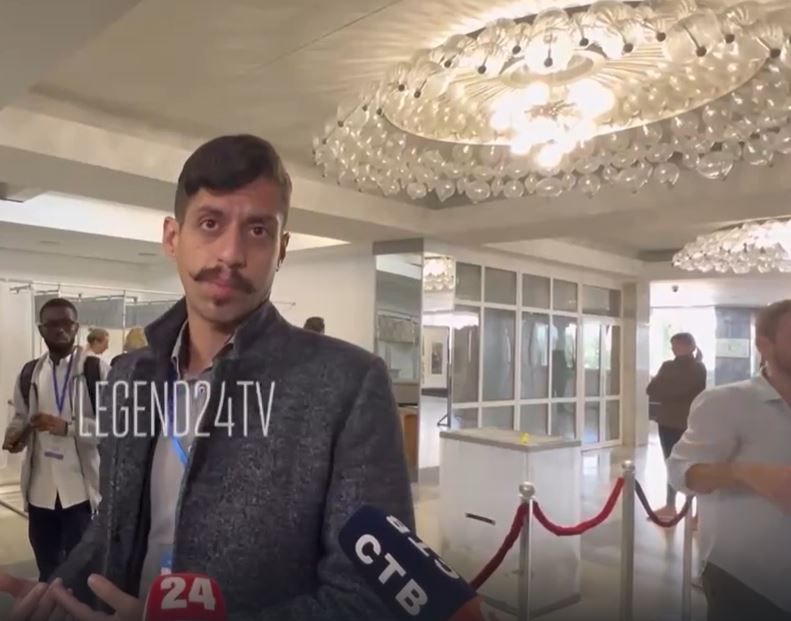
Several groups by types of professional activity can be singled out among the so-called “observers.” Among them, some individuals have been serving the interests of the Kremlin propaganda for many years now. Some do it indirectly, positioning themselves as independent journalists, bloggers, and experts. Some work directly for Russian state media or administer news websites that are clearly affiliated with the Kremlin. Another separate group is populist politicians and representatives of marginal far-left and far-right parties.
Propagandists
At least two correspondents of the Russian state news agency Sputnik acted as “observers” at the pseudo-referenda: American Wyatt Reed and Italian Eliseo Bertolasi.
Reed calls himself a left-wing activist, a fighter for racial justice and against imperialism. He runs a Telegram channel in which he “exposes” “Ukrainian fakes,” justifies Russian aggression against Ukraine and reposts other Kremlin channels.
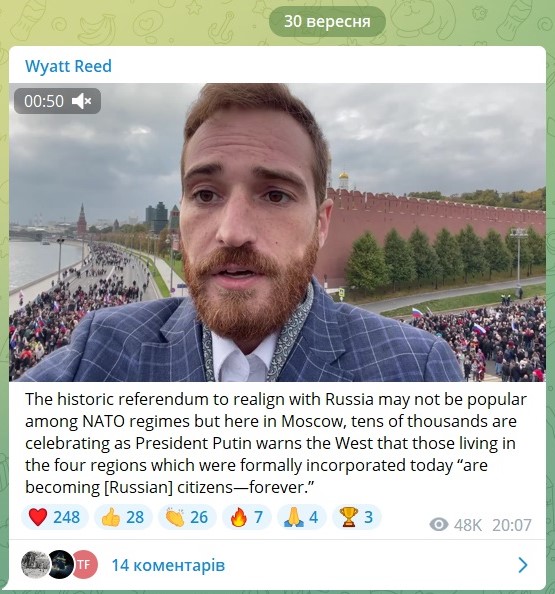
Reed’s Twitter account is labelled as “media affiliated with the Russian Federation.”
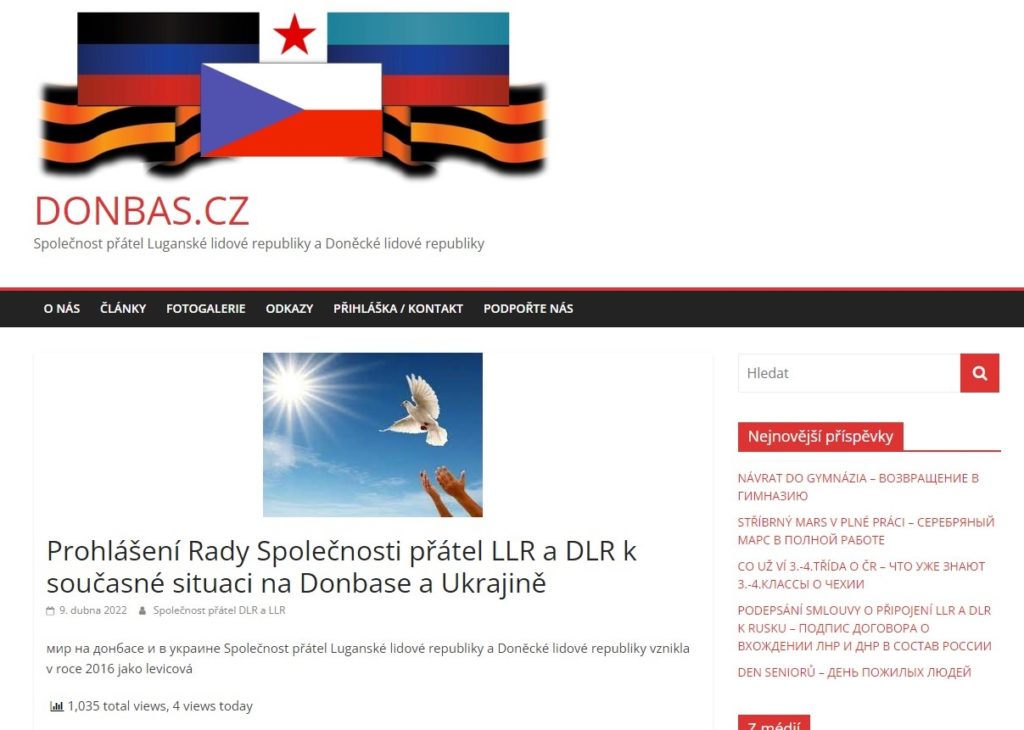
He is also the author of numerous op-eds for the American website The Grayzone, which regularly publishes fakes about “Ukrainian Nazis.”
Bertolasi worked with Russia Today, repeatedly visited the “ORDLO,” notably having “observed” the pseudo-elections in 2018, and promoted anti-Ukrainian narratives on the pages of Russian media.

Brazilian citizen Vanessa Martina Silva works as a reporter for the left-wing Colombian media Comunica Sul, sharing Russian propaganda about “the special operation” and “Ukrainian fascism.” At the beginning of October, three of the four top articles on the website were devoted to pseudoreferendums.
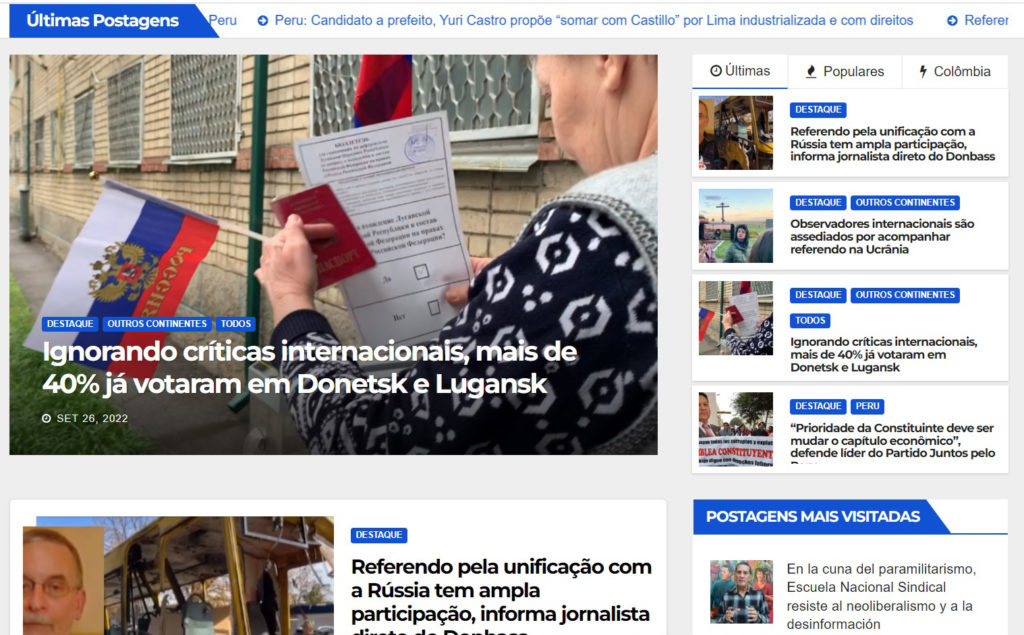
Italian Gianantonio Michalessin helped Russian propaganda back in 2017, filming Ukraine: The Hidden Truth, which promoted a fake story about the “Georgian snipers of the Maidan.”

Jaromir Vasek cooperates with donbas.cz, a website that relays Russian propaganda and disinformation to a Czech audience.
French citizen Kristel Nean headed the DoniPress press centre in occupied Donetsk until 2018, and later headed the press service of a “DPR Ministry.” Finnish citizen Janus Putkonen headed the propaganda news agency DoniNews.
“Putin’s Friends”
Another service to the Kremlin this time was provided by representatives of various NGOs promoting “friendship with Russia.”
Among the observers were Bosnian historian Oleg Soldat, who cooperates with the Russian government Russian World Foundation, president of the Spanish-Russian Eurasia Observatory (Observatorio Hispano-Ruso de Eurasia) Fernando Moragon, members of the Lithuanian pro-Russian organization “International Forum of Good Neighbourhood” Erik Švenčonene. and Edikas Jahelavcius and coordinator of the “Immortal Regiment of Montenegro” Igor Damjanovic.
The latter has been in the occupied territories at least since mid-March, performing the functions of a Russian military correspondent.
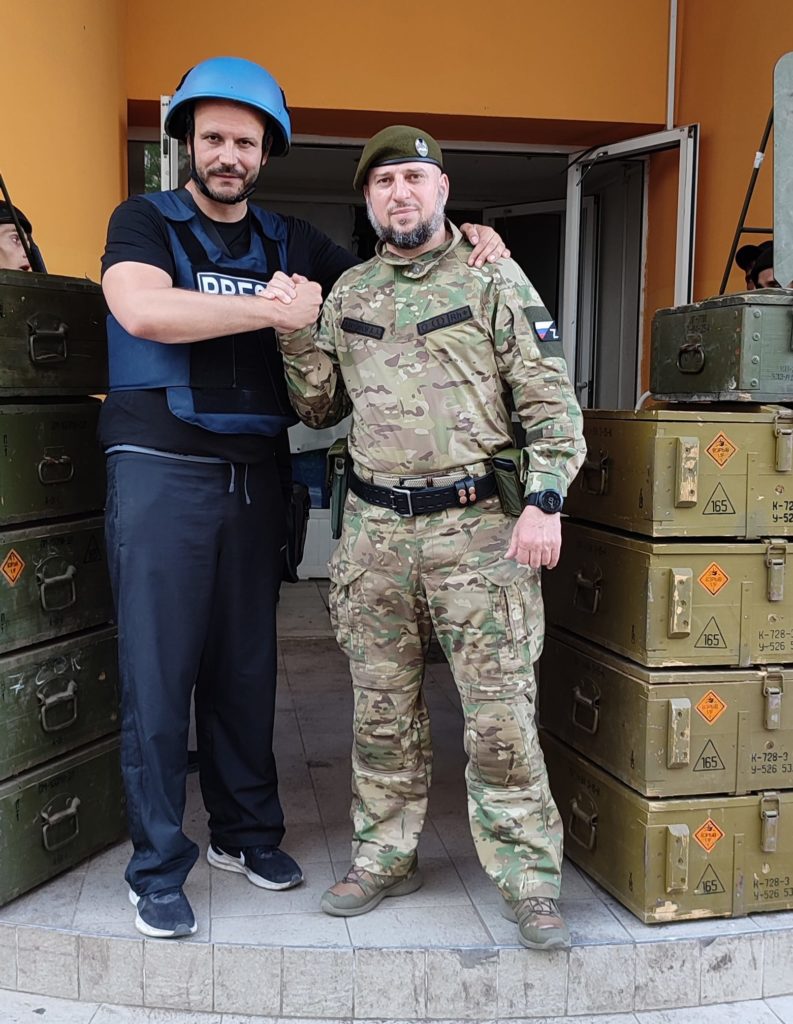
Another channel converting foreigners to the “Friends of Russia” club is business connections and studies at Soviet or Russian universities.
Italian Marco Pata organized legal support for trade agreements between Russian and Italian companies. Dia Nader El-Andari, a citizen of Venezuela, graduated from the Patrice Lumumba International People’s Friendship University in Moscow in the 1970s, where she defended her doctoral thesis. The head of the AFRIC think tank Jose Matemulane, a Mozambican citizen, studied in St. Petersburg. He was assigned to “observe” the “voting” in Oleshky, Kherson oblast.
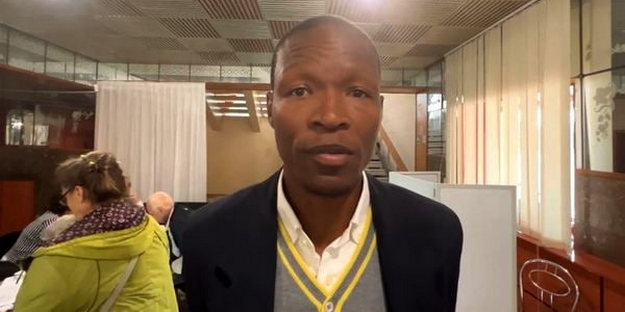
Populists, communists and neo-fascists
Representatives of radical parties and movements from Europe, Africa, and Latin America also demonstrated their traditional loyalty to Russia. Among the “observers” were both communists and their ideological opponents from the far-right. All of them are united by anti-globalism and hatred of imperialism. Exclusively American imperialism, too: they all prefer to “ignore” the imperialist and neocolonial nature of Russia’s aggression against Ukraine.
The aforementioned Sevastopol “observer” Enrique Dominguez is a member of the Communist Party of Brazil, Tanya Mara Mandarino was a member of the governing bodies of the “Workers’ Party” and ran for office in local elections on its behalf. Khulekani Mondli Skosana holds a leadership position in the executive committee of the Communist Youth League of South Africa. Czech communists Roman Blaško and Jaromir Vasek repeatedly visited the occupied territories of Ukraine before 2022.
The Norwegian municipal deputy Hendrik Weber, who was expelled from the ranks of the leftist party “Reds” (Rodt) in February this year for publicly supporting the “recognition of independence” of the “L/DPR” pseudo-republics, was yet another “observer.”
The far-right was represented by one of the leaders of the openly chauvinistic Serbian Radical Party, Dejan Mirović, ex-member of the dissolved Slovak Vlast party Lubica Blaskova, co-founder of the French “National Front” André Chanclu, spokesman for the French neo-fascist party “Les Nationalistes” Yvan Benedetti, and Christoph Hörstel, the leader of the “German Center” (Deutsche Mitte) party. “The Nationalists” and “German Center” are marginal xenophobic parties. They deny the Holocaust and Israel’s right to statehood. The French party considers itself an ideological follower of the collaborationist regime of marshal Petain, who worked with Hitler during the Nazi occupation of France in World War II.
Among politicians of the rather moderate wing, there is Brazilian Devanir Cavalcante, who publicly supports the ruling Social Democratic Party. He visited Russia several times and took part in the “Immortal Regiment” rally.
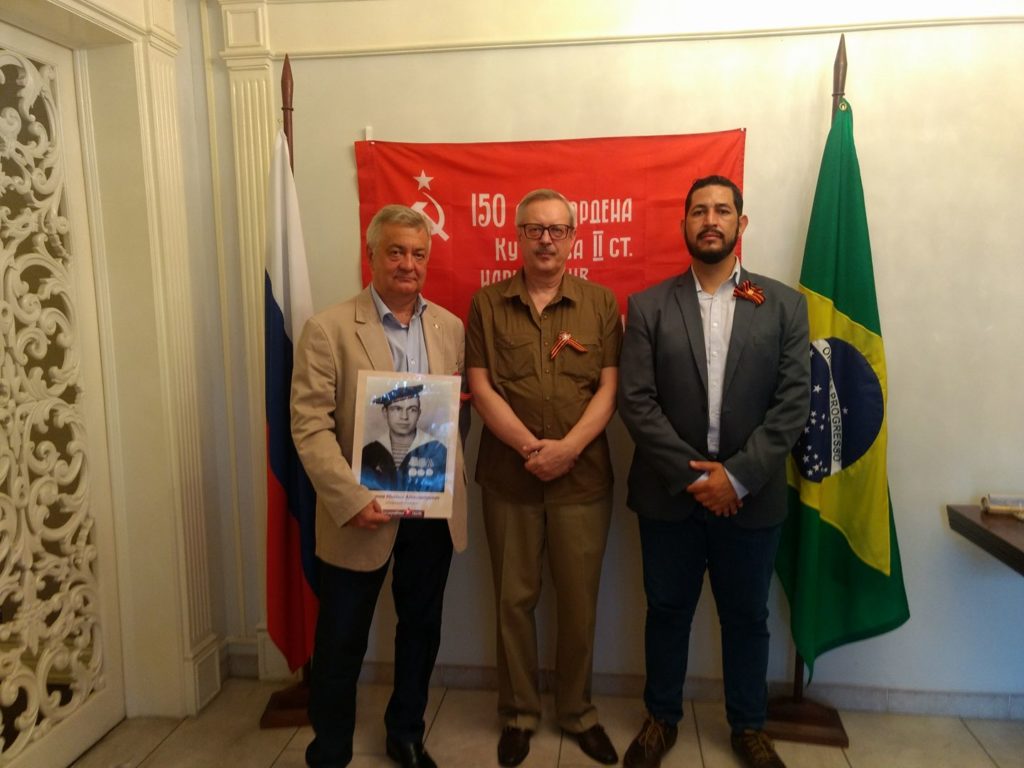
The Permanent Conference of Political Parties of Latin America and the Caribbean (COPPPAL), which unites socialist and liberal parties, is “represented” by two Uruguayans: the head of the COPPPAL youth association, Sebastian Agobian, and a member of the Socialist Party, Sebastian Lopez.
Italians Giuseppe Luca Genovese and Gianfranco Vestuto are members of the populist parties “Lega Nord” (North League) and “Lega Sud Ausonia” (South League). While the former is represented in the parliament, the second is a marginal organization that does not even have a single municipal council member. The party has a separatist stance, and its leader Vestuto is the editor-in-chief of Russia News, a media outlet disseminating the Kremlin propaganda.
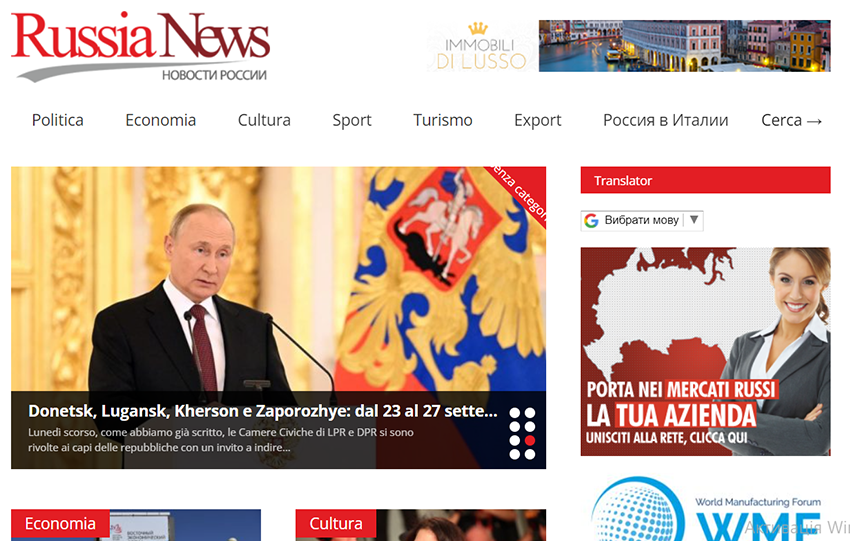
Thus, the Kremlin continues to use its agents of influence to create a picture of “international support” for its illegal actions. This material shows that Russian special services recruit foreigners by “establishing communication” with foreign students in Russia, the ultra-right, ultra-left, and populist parties and movements abroad, and they also finance research and cultural initiatives aimed, in particular, at the promotion of the Russian culture. Employees of the Russian state media are engaged in spreading propaganda and disinformation not only on the airwaves of the channels and on pages of their media outlets, but also on their social media profiles, directly “in the field.” This includes playing the roles of foreign “observers” at fake “elections” and pseudo-referenda in the occupied territories of Ukraine.
Ihor Solovey, Head of the Center for Strategic Communications and Information Security
If you have found a spelling error, please, notify us by selecting that text and pressing Ctrl+Enter.
